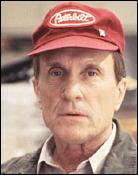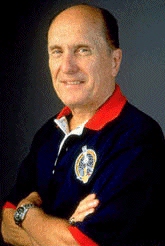Robert Duvall
I'm better than Olivier.
-- Robert Duvall
QUITE possibly the most versatile American actor in the history of cinema, Robert Duvall is also probably among the least likely to get mobbed at a mall. Unlike many of his peers, the chameleonic actor has demonstrated time and again the ability to utterly inhabit the characters he plays, eliminating all traces of his off-screen identity. Fellow senior citizen Richard Harris, who shared the screen with Duvall in the sentimental old codgers flick Wrestling Ernest Hemingway, described his co-star as the American equivalent of venerated British character actor Alec Guinness. Like Guinness, Duvall has essayed a host of widely varied roles in the course of a long and distinguished career, and met with consistently brilliant results. The variety in his body of work boggles the mind: Duvall has portrayed literary figures as dissimilar as The Scarlet Letter's vengeful antagonist, Roger Chillingsworth, and Sherlock Holmes' faithful sleuthing sidekick, Dr. Watson. With equal facility, he's resurrected historical personages as disparate as bloodthirsty Soviet dictator Josef Stalin and all-American general turned president Dwight Eisenhower. He's done Westerns (Geronimo: An American Legend, Lonesome Dove), sci-fi (The Handmaid's Tale, THX 1138), war flicks (The Eagle Has Landed), sports flicks (The Natural, Days of Thunder), cop flicks (Bullitt, Colors), pitch-black satire (M*A*S*H, Network, Falling Down), wrenching drama (Tender Mercies, The Great Santini), and even musicals (Newsies).

Born in San Diego, California, where his father, a career Navy man, was stationed at the time, Duvall was raised in Fairfax County, Virginia, ancestral home to several generations of family tobacco farmers. He claims he didn't watch movies much when he was a kid, but his mother was a talented amateur actress, and he and both of his brothers experienced limited success as professional singers. Duvall also demonstrated a natural ability for mimicry at a young age (a gift that became a source of both amusement and embarrassment for his parents), but in spite of his vocal endowments, Duvall's most serious aspirations were athletic, and he spent much of his youth as a member of various sports teams. It wasn't until he arrived at Principia College in Illinois that Duvall first gave much thought to a career in acting and that was only after he ended up flunking out of classes related to just about everything else. The United States was deeply entrenched in the Korean War at the time, and Duvall's parents were desperate to keep their middle child in school and out of the draft. When one of his drama professors told them their son was a natural and solicited their parental encouragement, they were only too happy to comply. "When I started taking theater classes I began to make all As," Duvall has since recalled. "Before that I didn't even know what an A was."
Though he eventually left Principia with a drama degree, Duvall wound up serving two years in Korea, anyway. When he was discharged from the Army and moved to New York to study acting at the Neighborhood Playhouse, Uncle Sam picked up the tab through the Montgomery G.I. Bill. In New York, Duvall shared an apartment with his older brother and four other aspiring actors, among them a young fellow by the name of Dustin Hoffman. Hoffman and Duvall, along with such future notable actors as James Caan and Gene Hackman, labored side by side under the tutelage of famed dramatician Sanford Meisner for several years.

Duvall earned the first raves of his career for his turn as a longshoreman in a Broadway production of A View From the Bridge. To keep afloat, he worked variously as a truck driver, a dishwasher, and a graveyard-shift postal clerk, remaining ever confident that he could eventually pay the bills as a professional actor. Ultimately, after four years of summer stock and numerous off-Broadway and TV assignments, he made his feature-film debut in the small role of Boo Radley, the silent, enigmatic neighbor of lawyer Atticus Finch (Gregory Peck) in the classic 1962 adaptation of the Pulitzer Prize-winning novel To Kill a Mockingbird.
Thereafter Duvall's career blossomed remarkably, and he appeared in more than 60 movies over the course of the next 35 years. The 1969 John Wayne vehicle True Grit, in which Duvall played Wayne's sneering nemesis, outlaw Ned Pepper, first introduced him to a wide American audience. Three years later, he delivered a fascinatingly nuanced performance in Francis Ford Coppola's The Godfather as the Corleone family consigliari, Tom Hagen, a role he would reprise for The Godfather, Part II. For 1979's Apocalypse Now, which re-teamed him with director Coppola and Godfather star Marlon Brando, Duvall delivered perhaps the most famous line of his career "I love the smell of napalm in the morning" as the surf-happy Colonel Kilgore.
Later that year, he proved his leading-man mettle with an Oscar-nominated turn as a career Marine estranged from his wife and children in The Great Santini. But four more years would pass before he took home a richly deserved Best Actor Oscar, for his moving portrayal of has-been country singer Mac Sledge in Tender Mercies. (The multitalented actor wrote and performed his own songs for the role.) Amazingly, Duvall found time during the same years to maintain his presence on the small screen, eventually graduating from appearances in such classic series as The Twilight Zone, The Outer Limits, and The Fugitive to equally heralded performances in miniseries such as 1989's adaptation of Larry McMurtry's Pulitzer Prize-winning elegy for the Old West, Lonesome Dove.

His limitless energy belying his advancing years, Duvall continued to work steadily into the '90s. Between 1993 and 1997 alone he played 13 lead and supporting feature-film roles and learned the tango to boot. Many critics felt he did the best work of his career as producer, director, screenwriter, and star of 1997's The Apostle, a penetrating observation on Southern evangelism and the personal price of religious faith. His performance in the title role brought him a Best Actor Oscar nomination.
Though he owns an apartment in New York that once belonged to crooner Enrico Caruso, Duvall spends most of his time away from Hollywood breeding and riding horses on a two hundred-acre farm he owns in Virginia. Since 1964, he has been married three times, most recently to dance instructor Sharon Brophy; their tumultuous divorce, which was set into motion by Duvall's allegations that Brophy had carried on an adulterous affair with a pool installer, dragged on for nearly three years. With a prominent role in the summer spectacular Deep Impact and an Oscar-nominated supporting turn alongside John Travolta in the long-awaited adaptation of the fact-based, best-selling legal potboiler A Civil Action, Duvall spent much of 1998 winning over a whole new generation of fans. As for his future filmmaking plans, the journeyman director, who lensed two features prior to The Apostle, has made several trips to Argentina to gather research for a film he hopes to write and direct about his own lately discovered dance passion, the tango.
Courtesy Mr. Showbiz Celebrity Biographies.